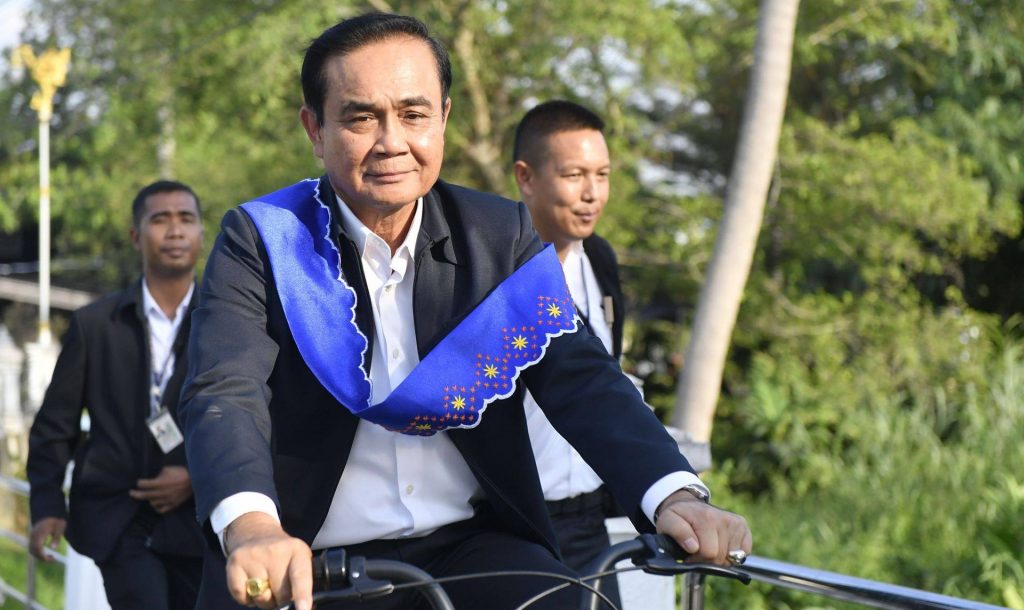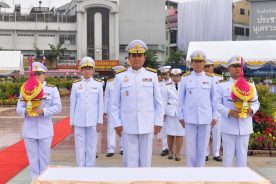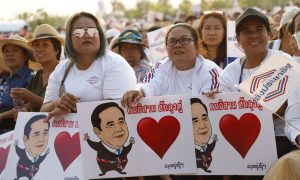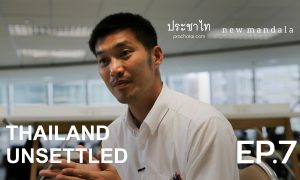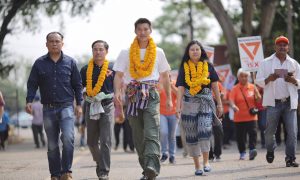General Prayuth Chan-ocha failed to utilise the 24 March election to secure the durability of his disguised authoritarian regime. The junta’s brainchild, Phalang Pracharat Party, was defeated at the poll. Commanding only 116 out of 500 seats in the House of Representatives, the party needed as many as 19 parties to form a governing coalition, making for the most fractured government in recent history. Too many cooks spoil the broth; too many parties spoil a government’s stability.
While the junta-appointed Senate was able to help Prayuth maintain the position of prime minister for a second term, it will not be able to secure his government in the parliamentary game. Unlike when Parliament votes in a prime minister, the upper house cannot join the lower house when the latter votes to pass bills—including the crucial annual budget for running the administration. Prayuth may not survive a motion of no confidence in the lower house if as few as five of the micro parties which won a single seat each withdraw from his coalition.
Signs of the instability to come have been visible since day one, when parliament voted to install house speakers. On 25 May, Phalang Pracharat’s proposal to delay the vote for the lower house speaker was rejected 248 against 246 votes. Five of its MPs failed to vote in favour of the proposal. The ruling coalition has since failed several times to secure its proposals in the lower house due to slim backing from MPs.
Another incident took place in the middle of August, when the outspoken MP and leader of the Thai Civilized Party, Mongkolkit Suksintaranont, rocked the boat by threatening to lead a group of five to pull out of the coalition. He alleged that Phalang Pracharat leaders broke a promise to give him and other micro parties choice positions in the government.
Nine parties—though not including Thai Civilized—finally agreed to maintain their support for Prayuth when Deputy Agriculture and Cooperatives Minister Thamanat Prompow, who was assigned by the ruling party to liaise with the micro parties, promised to allocate some positions in the government to them. Thammanat, who was convicted in Australia for drug smuggling 26 years ago, plays a crucial role in fixing such internal problems within the coalition. But he has his own problems too, as Australian media recently unveiled he was jailed for four years—not eight months as he previously claimed—for his crucial involvement in the drug trafficking.
This article examines the extent to which the “Prayuth Regime”, as outlined by the two prominent scholars Prajak Kongkirati and Veerayooth Kanchoochat in 2018, is an accurate framework for understanding relations of power between key institutions in the aftermath of the March election. In short, the Prayuth regime is one where “the army maintains their position as the dominant power while other institutions and political forces grow weaker and less united”. In The Prayuth Regime: Embedded Military and Hierarchical Capitalism in Thailand, the pair argue, “It does not matter which parties, Democrat or Pheu Thai, win the elections because the elected government will be placed under the control of the unelected minority elites with the military at the top of the power structure”. They document the then junta’s encroachment on not only democratic institutions and the state bureaucracy, but its co-optation of the country’s major corporations and conglomerates.
Although Prajak and Veerayooth saw the entrenchment of the junta’s power, they did not discuss sufficiently the relationship between the government led by retired generals and the broader armed forces. Attention to that distinction may suggest that “the Prayuth regime”, embodied in the new Phalang Pracharat-led administration, is less durable than meets the eye. To be fair to the two scholars though, it should be noted that their article was published nearly a year before the election, in which the party associated with former prime minister Thaksin Shinawatra, Pheu Thai Party, won the most seats of all parties.
In the first half of this piece, I will shed light on ties between the army and Prayuth’s so-called elected government, against the backdrop of a new monarch’s reign. In the second half of this piece, I discuss the tenuous popular base of Phalang Pracharat party by evaluating the success of the populist Pracharat scheme, another aspect of the regime emphasised by Prajak and Veerayooth.
A “military” regime?
It is widely believed that Phalang Pracharat has strong backing from the military, given that its founders were key members of Prayuth’s previous administration, such as Uttama Savanayana and Sontirat Sontijirawong. Even so, given the large and fragile makeup of the governing coalition, it is unlikely that Phalang Pracharat has significant bargaining power vis-à-vis the other parties. Other parties in the coalition—notably Bhumjaithai and the Democrat party, which obtained only 51 and 53 seats respectively—have managed to take key positions in cabinet, including the ministers of agriculture, transportation, commerce and public health.
Prajak and Veerayooth argue that prior to the election, the coup makers established direct military rule in which power and decision-making processes were centralised in the military institution and junta leaders. The regime of General Prayuth was divided into five organs known as mae nam ha sai (five rivers): the junta formally named the National Council for Peace and Order (NCPO), the cabinet, the National Legislative Assembly, the National Reform Council, and the Constitution Drafting Committee. It was clear from the composition of each organ that the military dominated the power structures of the mae nam ha sai.
But the Prayuth regime changed its character after the election. It has had to reduce the presence of the military in political structures and allow more civilian participation, notably in the form of elected politicians in the administration. Accordingly, we can see both changed institutional relations between the military and the so-called elected government, as well as shifting personal ties between government leaders and military elites.
Institutionally, the military maintains some capacity to dictate and guide the government through its presence in both the Senate and National Strategy Committee (the latter tasked with overseeing a “national strategic plan” to which governments are legally bound for the next 20 years). The top commanders of the army, navy and air forces, together with the national police chief, the Defence Ministry’s Permanent Secretary, and the Chief of Defence Forces, are required by the constitution and relevant laws to sit in the Senate and on the National Strategy Committee. Meanwhile the NCPO utilised an opaque appointment system to bring security personnel into the Senate. Of the 250 hand-picked senators, 92 are military and police officers. Either retired or still in service, they are on good terms with the previous junta’s leaders.
Prayuth, who has tried to keep a distance from Phalang Pracharat, has also installed non-party allies in key positions. He allocated deputies to his mentor General Prawit Wongsuwan, his economic tzar Somkid Jatusripitak and his legal hand Wissanu Krea-ngam. His predecessor in the army, General Anupong Paochina, got the top position at the interior ministry. Career diplomat Don Pramudwinai has continued serving as foreign minister. General Chanchai Changmongkol retained his position as deputy defence minister.
Legally speaking, Prayuth has the authority to control the armed forces. The military technically has the duty to defend the country and support the government under the prime minister’s command. But Thai military–government relations do not always operate along such a line of command. The armed forces are either a threat or support to the government depending on personal relations and power arrangements. Even the late General Prem Tinsulanonda, who had a solid military background and held the position of army chief when he entered politics, was challenged twice by military coup attempts during his premiership in the 1980s.
Not all military commanders or even coup leaders maintain their influence over the armed forces after retirement. Former coup leader General Sonthi Boonyaratglin, who toppled Thaksin in 2006, maintained diminishing influence in the army. Sonthi has remarked in his books that he faced the uphill task of forming what he called a “military party”—a political party with the military’s backing, or at least ex-military officers as members and supporters. His remarks indicate that his influence in the military waned after his retirement. There are some signs to suggest that General Prayuth might similarly maintain only limited influence over the armed forces now that he has left the army and the junta has come to an end.
First, Prayuth no longer has the special powers that he used to wield as the junta chief before the election. Under Article 44 of the 2014 charter, Prayuth exercised power as if he were the national sovereign. Such power no long exists after the dissolution of the NCPO and the swearing-in of the cabinet on 16 July.
Second, Prayuth has chosen to take up the position of defence minister himself, rather than leave the job to his mentor General Prawit, who is regarded as a “big brother” in the military, notably within the Burapha Payak (Eastern Tigers) faction under the Queen’s Guard. Prayuth and Prawit apparently remain on good terms but the latter had become a burden on the government due to his watch scandal.
Third, the influence of the Queen’s Guard/Eastern Tiger faction, in which Prayuth and Prawit are ex-bosses, has been in decline since it lost the position of army chief commander to General Chalermchai Sittisart of the Special Forces faction in 2016, and then more importantly to the faction’s arch rival, the King’s Guard/Wongthewan faction with the appointment of General Apirat Kongsompong in 2018.
Although army chief Apirat is in the Wongthewan faction, it has been argued that he has shown his loyalty to Prayuth and was promoted to higher positions under Prayuth’s patronage. Apirat led a group of soldiers in a showing of force in front of the office of media outlet ASTV Phujadkarn when it criticised Prayuth in January 2013. Apirat also held many key positions under Prayuth’s previous administration. As army chief, he acted as secretary-general of the NCPO, one of the most trusted positions in the junta regime.
But Apirat’s loyalty to Prayuth was questioned when King Maha Vajiralongkorn placed his faith in the Bangkok-based Wongthewan and reportedly personally picked Apirat to be army chief. The new monarch, who ascended to the throne during the junta’s regime after the passing of his father King Bhumibol Adulyadej in 2016, has since rearranged the military’s structure to secure his grip on the throne.
The former foreign minister of a royalist Democrat Party-led government, Kasit Piromya, has told foreign media that the King does not want to allow any factions to dominate the royal armed forces. “The King clearly wants a vertical hierarchy without any distractions and divisions that can cause splits in the army,” Kasit told the Nikkei Asian Review. “He views the Queen’s Guard as an aberration and something abnormal, and it is something he has been aware of as the crown prince.”
Since then, army chief Apirat has showed the public that he belongs to the new monarch, rather than to any bosses in the government. Sporting a crew cut hair style as the King designed, Apirat also wears the image of Prince Dipangkorn pinned on the left breast of his military uniform to indicate loyalty and connection to the King. Apirat said in October 2018 when he first took up the position of army chief that King Rama X is the real commander-in-chief of the Thai army. While saying he admired General Prayuth who supported him to the peak of his career, he reminded his fellows that the monarchy is the top priority for soldiers to protect.
While Apirat has said the army fully supports Prayuth’s government and vowed not to stage a coup against his boss, he gives priority to the work of protecting the King and the monarchy. Nor can anyone count on such a promise from Thai top brass. Prayuth himself went against his word in making a coup against the Yingluck administration. It is important to note also that Apirat is the son of a coup leader Soonthorn Kongsompong, who staged a coup against Chartichai Choonhavan in 1991.
King Maha Vajiralongkorn has not only extended his grip over the army, he has created his own armed forces for the safety of the royal family. The King controls both police and military security guards under the code Rajavallop 904. A unit under the Thai Royal Police assigned to provide security to the King was also renamed to be a royal guard police command within Rajavallop 904. In August, the palace requested the Supreme Commander and Army Commander help recruit military officers at or above the level of commander and chief of staff into unknown positions in the Rajavallop royal guard (according to letters from the Royal Secretary to the Supreme Commander and Army Commander dated 12 August 2019 seen by the author).
Meanwhile the Royal Decree on Organizing Government Affairs and Personal Administration for Royal Service 2017 transferred the 1st Infantry Regiment of the King’s Guard under the army to the palace’s Royal Security Command, where it is now directly subject to the monarch’s direction. Based in Samsen sub-strict in Phayathai, the three battalions had their name changed in April and again after the Royal Coronation in May to be specifically named after King Vajiralongkorn. The same order also placed the 11th Infantry Regiment in Bang Khen district under the Royal Security Command and the King.
What if Thailand’s junta can’t control the military?
General Prayuth may lead a government after elections this month, but his authority within the armed forces has long been waning.
Unfortunately, Prayuth and his mentor Prawit have neither showed nor proved their close connection to the new King. They cannot play a similar role to Prem by referring to the monarchy as a source of charisma over the military. As they have less influence over the military, current government leaders will not have the same bargaining chip to deal with Parliament. There will be major challenges as General Prayuth and his crew try to secure and sustain the government given parliamentary support is so slim.
How popular is the Prayuth regime?
In the aftermath of the election, the Phalang Pracharat-led administration claimed legitimacy on the basis of having won the popular vote (in terms of sheer votes; Pheu Thai won the most seats). The election results have also prompted a number of commentators to remark that popular support for military rule is far higher than previously estimated. “In retrospect, the March 2019 general election for Bangkok showed that there is an acrimonious divide in most of Thailand between voters and parties supporting the junta on one side and voters and parties opposing the junta on the other side,” write Napisa Waitoolkiat and Paul Chambers. Popular support for the current administration may appear less organic and impressive, however, when one considers the votes in proportion to the extensive funds channeled by the NCPO into populist welfare projects.
According to Prajak and Veerayooth, another defining characteristic of the Prayuth regime is its connection with the big conglomerates which have long dominated the Thai economy. The locus of that connection is the Pracharat project, which the junta launched in September 2015 in response to the populism of previous governments. As Prajak and Veerayooth put it, “The political drive is clear: to create a catchy new characterization that distances the regime’s grass-roots development policy from that of Thaksin’s populism (Prachaniyom), as well as co-opting the voting base of Thaksin in the provinces”.
Under the Pracharat scheme, the government issued ‘state welfare cash cards’ for low-income populations to buy discounted goods at government-designated “blue flag outlets”. The scheme is meant to help 11.67 million people registered as earning no more than 100,000 baht a year cope with living costs. People earning less than 30,000 baht a year will get a 300 baht monthly allowance, while those earning more than 30,000 baht but less than 100,000 baht a year will get a 200 baht monthly allowance. The card must be used to purchase consumer goods—produced mostly by big conglomerates—at registered blue flag shops only. The allowance cannot be exchanged for cash. A total of 24 big conglomerates whose products penetrate the lives of Thai people—including Thai Beverage Group, Charoen Pokphand Foods/True Corporation, Mitr Phol Sugar, Central Group, The Mall Group, Thai Union Group, Bangkok Bank, SCG Group, Thai President Foods and Saha Group—signed a pact to join the scheme in December 2015.
But such state-business relations are not unique to the Prayuth regime. Big corporations which dominate the Thai economy have long been able to link with the powers-that-be to protect and promote their interests. Studies by scholars such as Pasuk Phongpaichit and Nualnoi Trirat show how big corporations such as Thai Beverage Group have utilised political connections to dominate the alcohol industry and beverage market for decades. The Prayuth regime simply utilised the Pracharat project as its populist scheme to win the hearts and minds of the poor, though in the end it was widely criticised as a mechanism to divert a portion of the state budget ostensibly aimed at the poor to big conglomerates.
Prayuth’s government expects to allocate more than 41 billion baht annually to the project, which the poor have complained is too complicated and gives too little. Labelled with a blue flag, only 17,000 shops across the country have registered to join the scheme by accepting the government-issued electronic cards for payments on 252 discounted items. Ideally, the government wanted to have at least one shop in every tambon (sub-district). In practice, card holders have to travel perhaps 10 kilometers or more to a blue flag shop. The card can be used for bus and train fares in designated areas. But only state-owned transport accepts the cards. Many people would exhaust their 200 or 300 baht allowance travelling to and from blue flag shops.
The not-so-popular Pracharat scheme contributed to the failure of the Phalang Pracharat party in the 24 March election, as the pro-Thaksin camp’s Pheu Thai party defeated it with 137 out of 500 seats. Phalang Pracharat did not significantly benefit from the similarity of its name to Prayuth’s pet project. Pouring the government budget into a populist scheme targeting 11 million poor voters did not translate into a majority in the legislature, even though the military-sponsored constitution, election laws and regulations, as well as the electoral system, were all designed to give the pro-military camp the upper hand.
พลเอกประยุทธ์ จันทร์โอชา ล้มเหลวที่จะใช้การเลือกตั้งเมื่อวันที่ 24 มีนาคม ทำให้ระบอบการปกครองของเขาเข้มแข็ง เพราะพรรคพลังประชารัฐที่คณะรักษาความสงบแห่งชาติ (คสช) สร้างขึ้นพ่ายแพ้ในสนามเลือกตั้ง พรรคนี้มีที่นั่งเพียง 116 จากทั้งหมด 500 ในสภาผู้แทนราษฎรทำให้ต้องไปหาพรรคอื่นๆเข้ามาร่วมรัฐบาลเป็นจำนวนมากถึง 19 พรรค เพื่อให้ได้ 254 ที่นั่งมากพอจะจัดตั้งรัฐบาลและสนับสนุนให้พลเอกประยุทธ์เป็นนายกรัฐมนตรีอีกครั้ง ซึ่งทำให้รัฐบาลนี้กลายเป็นรัฐบาลที่มีพรรคร่วมมากที่สุดในประวัติศาสตร์ระยะสั้น มากหมอก็มากความฉันใดก็ฉันนั้น จำนวนพรรคการเมืองที่มากเกินไปทำให้รัฐบาลไร้เสถียรภาพ
แต่แม้ว่าวุฒิสภาจะช่วยนำพลเอกประยุทธ์กลับเข้าสู่ตำแหน่งเดิมได้อีกครั้งหนึ่ง แต่ไม่สามารถสร้างความมั่นคงในระบอบรัฐสภาให้กับรัฐบาลของเขาได้ เพราะสภาสูงไม่สามารถช่วยผ่านกฎหมายโดยเฉพาะกฎหมายงบประมาณ เพื่อให้รัฐบาลของเขานำไปใช้บริหารประเทศได้ พลเอกประยุทธ์และรัฐมนตรีอาจจะไม่สามารถรอดพ้นจากการอภิปรายไม่ไว้วางใจได้ ถ้าหากว่าพรรคขนาดเล็กแค่เพียง 5 พรรค (ซึ่งเข้าสภาได้เพราะระบบสัดส่วนจากการคำนวณของคณะกรรมการเลือกตั้ง) ถอนการสนับสนุนเขา
ความไร้เสถียรภาพเช่นนี้เกิดขึ้นตั้งแต่วันแรกเมื่อมีการเลือกประธานรัฐสภา ในวันที่ 25 พฤษภาคม ญัติของพรรคพลังประชารัฐที่ขอให้เลื่อนการเลือกประธานสภาออกไปก่อนแพ้ฝ่ายค้านในการลงคะแนนเสียง 248 ต่อ 246 แถมฝ่ายรัฐบาลอีก 5 คนอ้างว่าลงคะแนนผิดไปลงให้อีกฝ่ายหนึ่งแทนที่ฝ่ายรัฐบาล หลังจากนั้นพรรครัฐบาลแพ้โหวตหลายครั้งในการเลือกกรรมาธิการในสภา
มีเหตุการณ์เมื่อกลางเดือนสิงหาคม เมื่อมงคลกิตติ์ สุขสินธารานนท์ หัวหน้าพรรคไทยศิวิไลซ์ เขย่าเสถียรภาพรัฐบาลเมื่อเขาขู่ว่าจะพาพรรคการเมืองเล็กๆ 5 พรรคถอนตัวจากรัฐบาล เพราะพรรคพลังประชารัฐซึ่งเป็นแกนนำในการจัดตั้งรัฐบาลผิดสัญญาในการจัดสรรตำแหน่งให้กับพรรคเล็กๆเหล่านั้น สิ่งที่พลเอกประยุทธ์ต้องทำคือ หาตำแหน่งในรัฐบาลมาตกรางวัลเพื่อแลกกับการสนับสนุนของพวกเขา ในที่สุด 9 พรรคยกเว้นพรรคไทยศิวิไลซ์ของมงคลกิตติ์ประกาศร่วมรัฐบาลต่อไปเมื่อ รัฐมนตรีช่วยว่าการกระทรวงเกษตร ธรรมนัส พรมเผ่า ผู้อื้อฉาว ที่ได้รับมอบหมายจากพรรคพลังประชารัฐให้มากล่อมพวกเขาโดยสัญญาว่าจะหาตำแหน่งในรัฐบาลให้ ธรรมนัสแม้จะมีบทบาทสำคัญในการช่วยเคลียร์ปัญหาให้รัฐบาลแต่ตัวเขาเองก็มีปัญหาไม่น้อยเพราะถูกสื่อมวลชนเปิดโปงว่าเขาเคยต้องขัง 4 ปี ไม่ใช่ 8 เดือนอย่างที่เขาอ้าง ในคดีลักลอบขนยาเสพติดเข้าออสเตรเลียเมื่อ 26 ปีก่อน
วัตถุประสงค์ของบทความนี้คือเพื่อทดสอบคำอธิบายของนักวิชาการ 2 ท่าน ประจักษ์ ก้องกีรติและวีระยุทธ์ กาญจน์ชูฉัตร ในปี 2561 ต่อสิ่งที่เรียกว่าระบอบประยุทธ์นั้นแม่นยำเพียงไร เพื่อทำความเข้าใจความสัมพันธ์ทางอำนาจของสถาบันทางการเมืองหลังการเลือกตั้ง พูดง่ายๆ ระบอบประยุทธ์คือ การที่ทหารมีบทบาทนำทางการเมืองในขณะที่สถาบันอื่นๆอ่อนแอและไร้เอกภาพ ในบทความว่าด้วย “ระบอบประยุทธ์: การสร้างรัฐทหารและทุนนิยมช่วงชั้น” นักวิชาการทั้งสองโต้แย้งว่า ไม่สำคัญว่าพรรคประชาธิปัตย์หรือพรรคเพื่อไทยจะชนะเลือกตั้ง เพราะรัฐบาลที่มาจากการเลือกตั้งนั้นจะอยู่ภายใต้การควบคุมของชนชั้นนำเสียงข้างน้อยโดยที่มีกองทัพอยู่ส่วนบนของโครงสร้างอำนาจ ในบทความนั้นบอกว่า คณะทหารไม่เพียงแต่รุกเข้าไปในสถาบันประชาธิปไตยและระบบราชการ แต่ยังร่วมมือกับทุนขนาดใหญ่ของประเทศอีกด้วย
แม้ว่าประจักษ์และวีระยุทธ์จะมองเห็นอำนาจของคณะทหาร (คณะรักษาความสงบแห่งชาติ-คสช.) แต่ก็ไม่ได้อภิปรายอย่างเพียงพอเกี่ยวกับความสัมพันธ์ระหว่างนายพลเกษียณของคสช.กับกองทัพ ถ้าเรามุ่งไปที่นี่จะทำให้เห็นว่า ระบอบประยุทธ์ที่อยู่ในร่างของรัฐบาลที่มาจากการเลือกตั้งภายใต้การนำของพลังประชารัฐก็ดูไม่ใช่อะไรที่คงทนมากนัก แต่เพื่อความเป็นธรรมกับนักวิชาการทั้งสองท่าน ควรจะบันทึกไว้ว่า บทความนั้นเขียนขึ้นเกือบหนึ่งปีก่อนการเลือกตั้งเมื่อวันที่ 24 มีนาคม ซึ่งผลคือพรรคเพื่อไทยซึ่งเป็นพันธมิตรสำคัญของอดีตนายกรัฐมนตรีทักษิณ ชินวัตร ได้ที่นั่งมากที่สุด
ในบทความนี้มี 2 ส่วน กล่าวคือส่วนแรกผู้เขียนมุ่งให้ความกระจ่างในความสัมพันธ์ระหว่างกองทัพและรัฐบาลของพลเอกประยุทธ์ โดยมีการเถลิงราชสมบัติของรัชกาลใหม่เป็นฉากของท้องเรื่อง ส่วนที่สองจะพูดถึง ความนิยมของพรรคพลังประชารัฐและโครงการประชารัฐ (เพื่อมองถึงความสัมพันธ์ระหว่างรัฐและทุน) ซึ่งเป็นประเด็นที่ประจักษ์และวีระยุทธ์ให้ความสำคัญในบทความก่อน
ระบอบทหาร ?
เป็นที่เข้าใจกันโดยทั่วไปว่า พรรคพลังประชารัฐนั้นมีทหารหนุนหลัง เพราะผู้ร่วมก่อตั้งคนสำคัญ เช่น อุตตม สาวนายน และสนธิรัตน์ สนธิจิรวงศ์ คือรัฐมนตรีของรัฐบาลประยุทธ์ชุดก่อน (ตอนหลังพลเอกประวิตร วงษ์สุวรรณ ก็เปิดตัวนั่งเป็นประธานยุทธศาสตร์พรรคเพื่อแสดงการควบคุมพรรคนี้ชัดเจนขึ้น) ถึงอย่างนั้นก็ตามพรรคพลังประชารัฐก็ดูจะเป็นพรรคที่ไม่ค่อยมีอำนาจต่อรองทางการเมืองมากนัก พรรคอี่นที่ตัดสินใจเข้าร่วมรัฐบาล เช่นพรรคภูมิใจไทยและพรรคประชาธิปัตย์มีที่นั่งในสภา 51 และ 53 ที่นั่งตามลำดับดูเหมือนจะได้กระทรวงดีๆตามที่ต้องการไปหลายกระทรวง เช่น กระทรวงเกษตร คมนาคม พาณิชย์และสาธารณสุข
บทความของประจักษ์และวีระยุทธ์ กล่าวว่า ก่อนการเลือกตั้ง ทหารปกครองประเทศโดยตรง โดยรวมศูนย์การตัดสินใจเอาไว้ที่สถาบันทหารและคสช. โดยแบ่งสายงานออกเป็น 5 กลุ่มซึ่งเรียกกันโดยทั่วไปว่า แม่น้ำห้าสาย กล่าวคือ ตัวคสช,เอง (ซึ่งเป็นส่วนหัวของระบอบนี้) คณะรัฐมนตรี สภานิติบัญญัติแห่งชาติ สภาขับเคลื่อนการปฏิรูปและคณะกรรมการร่างรัฐธรรมนูญ โดยมีทหารเป็นผู้ครอบงำโครงสร้างเหล่านี้ทั้งหมด
แต่ระบอบประยุทธ์เปลี่ยนแปลงบุคลิกหลังจากมีการเลือกตั้งแล้ว เพราะมีความจำเป็นจะต้องลดการปรากฏตัวของทหารลงพร้อมทั้งอนุญาตให้พลเรือนมีส่วนร่วมทางการเมืองมากขึ้น นั่นก็ทำให้ต้องเปลี่ยนแปลงความสัมพันธ์ในเชิงสถาบันระหว่างทหารกับรัฐบาลที่ได้ชื่อว่ามาจากการเลือกตั้งด้วยเช่นกัน อีกทั้งความสัมพันธ์ที่เชิงตัวบุคคลของผู้นำในรัฐบาลกับผู้นำทางทหารก็เปลี่ยนแปลงไปด้วย
ในเชิงสถาบันจะมีนายทหารนั่งอยู่ในเฉพาะวุฒิสภาและคณะกรรมการยุทธศาสตร์ชาติเท่านั้น เพื่อที่จะกำหนดทิศทาง กำกับรัฐบาลให้ดำเนินการตามยุทธศาสตร์ 20 ปีที่คสช.เคยวางเอาไว้ ผู้ที่ดำรงตำแหน่ง ปลัดกระทรวงกลาโหม ผู้บัญชาการกองทัพไทย ผู้บัญชาการทหารบก ผู้บัญชาการทหารเรือ ผู้บัญชาการทหารอากาศ ผู้บัญชาการสำนักงานตำรวจแห่งชาติ เลขาธิการสภาความมั่นคงแห่งชาติ ต้องเข้าไปเป็นสมาชิกองค์กรทั้งสองโดยตำแหน่ง นอกจากนี้คสช.ยังอาศัยความคลุมเครือ ระบบอุปถัมภ์และเครือญาติตั้งคนของตัวเองเข้าไปนั่งในวุฒิสภาอีกเป็นจำนวนมาก ในบรรดาวุฒิสมาชิก 250 คนนั้น มีผู้ที่มีพื้นฐานทางอาชีพจากทหารตำรวจและเจ้าหน้าที่ฝ่ายความมั่นคงมากถึง 92 คน ทั้งในและนอกราชการ โดยที่คนเหล่านี้มีความสัมพันธ์อันดีกับผู้นำในรัฐบาลประยุทธ์ (ทั้งในอดีตและปัจจุบัน)
พลเอกประยุทธ์ (ซึ่งได้รับการเสนอชื่อให้เป็นนายกรัฐมนตรีโดยพรรคพลังประชารัฐ) พยายามที่จะรักษาระยะห่างกับพรรคและมีโควต้ารัฐมนตรีของตัวเองส่วนหนึ่งที่จัดสรรให้ลูกพี่ใหญ่ ประวิตร วงษ์สุวรรณ มือเศรษฐกิจเก่า สมคิด จาตุศรีพิทักษ์ นิติบริกร วิษณุ เครืองาม ในตำแหน่งรองนายกรัฐมนตรี รุ่นพี่ในสายทหาร พลเอกอนุพงศ์ เผ่าจินดา รั้งตำแหน่งรัฐมนตรีมหาดไทยเอาไว้ดังเดิม และ นักการทูตอาชีพ ดอน ปรมัติวินัย เป็นรัฐมนตรีต่างประเทศต่อไป และลูกหม้อกองทัพ พลเอกชัยชาญ ช้างมงคล เป็นรัฐมนตรีช่วยว่าการกลาโหมให้เขา
ว่ากันตามหลักการ ระบอบประยุทธ์ (ในปัจจุบัน) ก็มีอำนาจบังคับบัญชากองทัพอยู่แล้ว ในขณะที่กองทัพก็มีหน้าที่ป้องกันประเทศและสนับสนุนรัฐบาล ภายใต้การกำกับของนายกรัฐมนตรี (ซึ่งก็คือประยุทธ์) อีกด้วยเช่นกัน แต่ดูเหมือนความสัมพันธ์ระหว่างกองทัพและรัฐบาลจะไม่เป็นไปตามสายบังคับบัญชาแบบนั้น ไม่ว่าใครจะเป็นหัวหน้ารัฐบาล กองทัพไทยสามารถเลือกที่จะสนับสนุนหรือเป็นปรปักษ์ภัยคุกคามก็ได้ ทั้งหมดขึ้นอยู่กับความสัมพันธ์ส่วนตัวและการจัดสรรอำนาจ พลเอกเปรม อดีตประธานองค์มนตรีผู้ล่วงลับที่เคยได้ชื่อว่ามีอำนาจบารมีเหนือกองทัพมากที่สุดในประวัติศาสตร์ยุคหลัง เข้าสู่การเมืองทั้งที่ยังรั้งตำแหน่งผู้บัญชาการทหารบกอยู่ด้วยซ้ำ ก็ยังเคยเผชิญหน้ากับการท้าทายจากกองทัพที่พยายามทำรัฐประหารถึงสองครั้งในช่วงที่เขาเป็นนายกรัฐมนตรีในช่วงทศวรรษ 1980
โดยพื้นฐานแล้วไม่ใช่อดีตผู้บัญชาการทหารหรือแม้แต่ผู้นำการรัฐประหารจะสามารถคงอำนาจและอิทธิพลเหนือกองทัพเอาไว้ได้ทุกคน พลเอกสนธิ บุญยรัตกลิน อดีตผู้บัญชาการทหารบกผู้ที่นำการรัฐประหารโค่นทักษิณในปี 2549 ได้ชื่อว่าหลงเหลืออิทธิพลเหนือกองทัพไทยน้อยที่สุดคนหนึ่ง อดีตนักรัฐประหารผู้นี้เขียนเอาไว้ในหนังสือของเขาว่า ไม่ใช่เรื่องง่ายเลยที่จะตั้ง “พรรคทหาร” คือพรรคการเมืองที่มีกองทัพหนุนหลังหรืออย่างน้อยมีนายทหารเกษียณเข้าร่วมก่อตั้งหรือเป็นสมาชิกสำคัญ นั่นสะท้อนว่าตัวเขาเองไม่ได้มีอิทธิพลอะไรในกองทัพพอที่จะดึงการสนับสนุนมาได้ (แม้แต่ในระดับตัวบุคคล) มีดัชนีบ่งชี้บางประการที่จะบอกว่า อิทธิพลของพลเอกประยุทธ์ก็ไม่ได้เหลืออยู่ในกองทัพไทยมากนักเมื่อเขาต้องเกษียณอายุราชการและอำนาจในฐานะประธานคสช.หมดไป
อย่างแรกเลยทีเดียว อำนาจพิเศษที่ประยุทธ์เคยใช้อย่างสะดวกตามอำเภอใจ ตามมาตรา 44 ของรัฐธรรมนูญ 2557 หมดไปเมื่อคสช.จำต้องสิ้นสภาพไปหลังคณะรัฐมนตรีเข้าถวายสัตย์เมื่อวันที่ 16 กรกฎาคม
ประการที่สอง ประยุทธ์ในฐานะนายกรัฐมนตรีซึ่งมีอำนาจบังคับบัญชาทุกองค์กรภายใต้รัฐบาลของเขาได้อยู่แล้วตามกฎหมาย กลับจำเป็นต้องควบตำแหน่งรัฐมนตรีว่ากระทรวงกลาโหมอีกตำแหน่งแทนที่จะมอบให้กับประวิตร ผู้ที่ได้ชื่อว่าเป็นพี่ใหญ่ของทหารสายบูรพาพยัคฆ์ ความจริงแล้วความสัมพันธ์ทั้งสองก็ยังดีอยู่ เพียงแต่ระยะหลังประวิตรแสดงให้เห็นว่ามีปัญหาสุขภาพและเรื่องฉาวโฉ่เกี่ยวกับนาฬิกาของเขาดูเหมือนจะกลายเป็นภาระทางการเมืองให้กับรัฐบาลประยุทธ์มากกว่า
ประการที่สาม อิทธิพลในกองทัพของทหารเสือราชินีหรือที่รู้จักกันในนามบูรพาพยัคฆ์ที่ทั้งประวิตรและประยุทธ์เป็นหัวหน้าใหญ่ลดต่ำลงมาก นับแต่นายทหารจากสายอื่นขึ้นดำรงตำแหน่งผู้บัญชาการทหารบก เช่น พลเอกเฉลิมชัย สิทธิสาท สายรบพิเศษในปี 2559 และ ทหารรักษาพระองค์ในสายวงศ์เทวัญคู่แข่งสำคัญของบูรพาพยัคฆ์อย่าง อภิรัชต์ คงสมพงษ์ ในปี 2561
แม้ว่าจะมีข้อถกเถียงว่า พลเอกอภิรัชต์ เป็นนายทหารสายวงศ์เทวัญก็จริงแต่เติบโตภายใต้อุปถัมภ์ของพลเอกประยุทธ์มาโดยตลอด เขาเคยแสดงความภักดีต่อพลเอกประยุทธ์อยู่เนืองๆเช่นนำทหารตบเท้าหน้าสำนักงานหนังสือพิมพ์ASTV ผู้จัดการในเดือนมกราคม 2556 เพราะสื่อในเครือดังกล่าวเขียนข่าวโจมตีประยุทธ์ นั่นทำให้อภิรัชต์ได้รับการสนับสนุนให้เติบโตในกองทัพได้อย่างรวดเร็วระหว่างที่ประยุทธ์มีอำนาจ ทั้งในกองทัพ คสช.และรัฐบาลยุคคสช. อภิรัชต์ได้รับความไว้วางใจให้นั่งในคสช.ในฐานะเลขาธิการและอีกหลายตำแหน่งในสมัยนั้น
อย่างไรก็ตาม ความภักดีของอภิรัชต์ต่อประยุทธ์ถูกตั้งคำถาม เมื่อปรากฏว่ากษัตริย์รัชกาลที่ 10 ดูเหมือนจะมีศรัทธาต่อทหารในสายวงศ์เทวัญของอภิรัชต์มากกว่าบูรพยัคฆ์ของประยุทธ์อีกทั้งมีรายงานว่า อภิรัชต์ขึ้นสู่ตำแหน่งสูงสุดในกองทัพบกเพราะการคัดเลือกของพระองค์เอง นอกจากนี้รัชกาลที่ 10 ยังได้ดำเนินการปรับโครงสร้างอำนาจบางส่วนของกองทัพเสียใหม่หลังจากขึ้นครองราชย์แทนรัชกาลที่ 9 ในปี 2559 เพื่อที่จะสร้างความมั่นคงปลอดภัยให้กับราชบัลลังก์ของพระองค์เอง
กษิต ภิรมย์ อดีตรัฐมนตรีต่างประเทศในรัฐบาลที่นำโดยพรรคประชาธิปัตย์ (2551-2554) บอกกับสื่อมวลชนต่างประเทศว่า กษัตริย์ไม่ต้องการให้ฝ่ายใดฝ่ายหนึ่งครอบงำกองทัพ “เป็นที่แน่ชัดว่าพระองค์ต้องการเห็นโครงสร้างลำดับชั้นในแนวตั้งที่ปราศจากความแตกแยกแบ่งฝักใฝ่ในกองทัพ” กษิต บอกกับ นิเคอิเอเชียนรีวิว “พระมหากษัตริย์ทรงเห็นว่าทหารเสือราชินี (บูรพาพยัคฆ์) เป็นสิ่งประหลาดผิดปกติ ซึ่งเป็นสิ่งที่พระองค์ตระหนักเมื่อครั้งยังทรงเป็นสยามมกุฎราชกุมารแล้ว”
ในขณะเดียวกัน ผู้บัญชาการทหารบกคนปัจจุบันก็ได้แสดงให้เห็นเป็นที่ประจักษ์ว่า เขาจงรักภักดีต่อกษัตริย์เหนือกว่าผู้นำคนใดในรัฐบาล ทรงผมที่เกรียนติดหนังหัวและเข็มกลัดรูปเจ้าฟ้าทีปังกรรัศมีโชติที่ติดหน้าอกซ้ายเครื่องแบบทหารของเขาบ่งบอกให้คนทั่วไปรู้ว่าเป็นใกล้ชิดเบื้องยุคลบาทกว่าใครๆ พลเอกอภิรัชต์กล่าวเมื่อครั้งรับตำแหน่งใหม่ในเดือนตุลาคม 2561 ว่า พระมหากษัตริย์ทรงเป็นจอมทัพไทย แม้ว่าเขาจะให้การเคารพนับถือพลเอกประยุทธ์ที่ได้ช่วยอุปถัมภ์ค้ำชูให้เขาได้ดิบได้ดีในกองทัพ แต่เขาก็บอกผู้นำเหล่าทัพทั้งหลายว่า กองทัพมีหน้าที่ปกป้องพระมหากษัตริย์เหนือสิ่งอื่นใด
แม้อภิรัชต์จะพูดเสมอว่าเขาสนับสนุนรัฐบาลของพลเอกประยุทธ์อย่างเต็มที่และจะไม่มีการรัฐประหารในสมัยที่เขาเป็นผู้บัญชาการทหารบก แต่ก็ไม่มีใครเชื่อคำพูดแบบนี้ของทหารไทย ผู้นำเหล่าทัพรวมทั้งประยุทธ์เอง (ที่ยึดอำนาจจากยิ่งลักษณ์ ชินวัตร) ก็เคยพูดว่าจะไม่ทำรัฐประหารมาแล้วทั้งสิ้น ที่สำคัญคือ อภิรัชต์เป็นบุตรชายของพลเอกสุนทร คงสมพงษ์ อดีตผู้บัญชาการทหารสูงสุดที่เคยทำรัฐประหารยึดอำนาจพลเอกชาติชาย ชุณหะวันในปี 2534
รัชกาลที่ 10 ไม่เพียงแต่กระชับอำนาจเหนือกองทัพเท่านั้น หากยังสร้างกองทัพที่มีสายบังคับบัญชาที่ขึ้นตรงกับพระองค์โดยตรงอีกด้วย เพื่อความปลอดภัยส่วนพระองค์ กองกำลังรักษาพระองค์ ราชวัลลภ 904 มีทั้งทหารและตำรวจ มีการปรับเปลี่ยนภายในสำนักงานตำรวจแห่งชาติโดยเปลี่ยนชื่อ กองบัญชาการถวายความปลอดภัย และปฏิบัติการพิเศษเป็นกองบัญชาการตำรวจมหาดเล็กราชวัลลภรักษาพระองค์ 904 (โดยมีพลตำรวจตรี ต่อศักดิ์ สุขวิมล เป็นผู้บัญชาการ) ในเดือนสิงหาคม กองกิจการในพระองค์ สำนักราชเลขานุการในพระองค์ ได้มีหนังสือไปยังผู้บัญชาการทหารสูงสุดและผู้บัญชาการทหารบก เพื่อขอคัดเลือกนายทหารชั้นสัญญาบัตรเพื่อปฏิบัติหน้าที่ถวายงานในกองบัญชาการทหารมหาดเล็กรักษาพระองค์
ก่อนหน้านี้ได้มี พระราชกฤษฎีกาจัดระเบียบราชการและการบริหารงานบุคคลของราชการในพระองค์ 10 พฤษภาคม 2560 ประกอบกับประกาศสำนักนายกรัฐมนตรี เรื่องพระราชทานพระบรมราชานุญาตเปลี่ยนแปลงหน่วยทหารรักษาพระองค์และหน่วยทหารในพระองค์ ปรับปรุงหน่วยทหารหลายหน่วยให้พ้นจากการเป็นหน่วยรักษาพระองค์และหน่วยทหารในพระองค์ โดยสถาปนากรมการทหารราบที่ 1และ 11 เป็นมหาดเล็กราชวัลลภรักษาพระองค์ ไปขึ้นกับหน่วยบัญชาการถวายความปลอดภัยรักษาพระองค์ ซึ่งเป็นหน่วยขึ้นตรงต่อพระมหากษัตริย์ (ราชกฤษฎีกาจัดระเบียบราชการและการบริหารงานบุคคลของราชการในพระองค์ มาตรา 8 วรรค 2)
แม้ว่าประยุทธ์อาจจะอยากแต่คงไม่สามารถประยุกต์ตัวแบบทางการเมืองของพลเอกเปรม คือ อาศัยอำนาจบารมีในกองทัพมาเป็นเครื่องมือต่อรองกับบรรดานักการเมืองในสภาได้ บารมีของพลเอกเปรมในกองทัพนั้นก็ไม่ได้เป็นเรื่องส่วนตัวเสียทั้งหมด หากแต่เขาสามารถอ้างอิงความสัมพันธ์ที่ใกล้ชิดกับรัชกาลที่ 9 มาสร้างบารมีให้กับตัวเองมากกว่า จึงสามารถเล่นบทบาทในฐานะผู้จัดสรรอำนาจได้
แต่ประยุทธ์และประวิตรไม่เคยแสดงหรือพิสูจน์ให้เห็นได้อย่างประจักษ์เลยว่า พวกเขามีความสัมพันธ์อันดีกับกษัตริย์องค์ใหม่ เมื่อไม่สามารถอ้างชื่อพระองค์ได้ ประยุทธ์ก็ไม่สามารถเล่นบทแบบพลเอกเปรมได้ เมื่ออ้างกษัตริย์ไม่ได้ ก็ไม่สามารถแสดงบารมีในกองทัพได้และในเมื่อไม่มีบารมีในกองทัพ นักการเมืองก็ไม่ยำเกรงระบอบของเขาจึงง่อนแง่น
ระบอบประยุทธ์เป็นที่นิยมแค่ไหน?
หลังการเลือกตั้งแล้วพรรคพลังประชารัฐอ้างว่าได้คะแนนเสียงในการเลือกตั้งมากที่สุดจึงเป็นความชอบธรรมที่จะเป็นแกนนำในการจัดตั้งรัฐบาล (ในขณะที่พรรคเพื่อไทยอ้างสิทธิจากการที่ได้ที่นั่งมากเป็นอันดับหนึ่งเพื่อเป็นแกนในการจัดตั้งรัฐบาล) นักวิเคราะห์ทางการเมืองส่วนหนึ่งเห็นว่าคะแนนจากการเลือกตั้งนั้นสะท้อนว่าระบอบทหารเป็นที่นิยมมากด้วยเช่นกัน นภิสา ไวฑูรเกียรติ และ พอล เซมเบอรส์ เขียนเอาไว้ว่า “หากย้อนกลับไปดู การเลือกตั้งในเดือนมีนาคม 2019 แสดงให้เห็นว่าความแตกแยกระหว่างฝ่ายที่นิยมคณะทหารกับฝ่ายที่ต่อต้านยังมีอยู่อย่างชัดเจน” แต่อย่างไรก็ตาม ถ้าหากดูจากงบประมาณและทรัพยากรที่ (รัฐบาลประยุทธ์) ทุ่มเทลงไปผ่านโครงการสวัสดิการต่างๆ คะแนนนิยมแค่นั้นไม่น่าประทับใจเท่าไหร่เลย
ดังที่ ประจักษ์และวีระยุทธ์กล่าวเอาไว้ บุคลิกสำคัญประการหนึ่งของระบอบประยุทธ์คือ การเชื่อมโยงกับบริษัทธุรกิจขนาดใหญ่ ซึ่งครอบงำเศรษฐกิจไทยมาเป็นเวลานาน โดยมีโครงการประชารัฐ เป็นตัวเชื่อมที่สำคัญ โครงการนี้เปิดตัวเมื่อเดือนกันยายน 2558 เพื่อตอบโต้กับโครงการประชานิยมของรัฐบาลก่อน ดังที่นักวิชาการสองกล่าว โครงการประชารัฐ “มีพลังขับดันทางการเมืองที่ชัดเจน คือความพยายามสร้างบุคลิกของนโยบายเศรษฐกิจรากหญ้าให้ต่างจากนโยบายประชานิยมของทักษิณเพื่อแย่งฐานทางการเมืองในต่างจังหวัด” ในบรรดาบริษัทขนาดใหญ่ 24 บริษัทที่เข้าร่วมโครงการประชารัฐในเดือนธันวาคม 2558 นั้นรวมถึงบริษัทอย่าง ไทยเบพ เครือเจริญโภคภัณฑ์ มิตรผล เซ็นทรัล เดอะมอลล์ ไทยยูเนียน ธนาคารกรุงเทพ เครือซีเมนต์ไทย ไทยเฟสซิเดนท์ฟูด สหกรุ๊ป ที่ผลิตสินค้าอุปโภคบริโภคให้คนใช้ในชีวิตประจำวันอยู่แล้ว
แต่ในความเห็นของผู้เขียน ความสัมพันธ์ระหว่างรัฐและทุนแบบนี้ไม่ได้เป็นลักษณะเฉพาะของระบอบประยุทธ์เลย บริษัทธุรกิจเหล่านี้ครอบงำเศรษฐกิจไทยมานานและเชื่อมโยงกับผู้มีอำนาจทุกยุคทุกสมัย การศึกษาของนักวิชาการหลายคนก่อนหน้านี้ รวมทั้ง ผาสุก พงษ์ไพจิตรและนวลน้อย ตรีรัตน์ แสดงให้เห็นว่าบริษัทขนาดใหญ่อย่าง ไทยเบฟ ได้ใช้เส้นสายทางการเมืองเพื่อครอบงำอุตสาหกรรมสุราและตลาดเครื่องดื่มประเภทนี้มานานแล้ว สำหรับผู้เขียนแล้วประยุทธ์หวังใช้โครงการประชารัฐเพื่อสร้างประชานิยมของตัวเองและโครงการนี้ก็ได้รับการวิพากษ์วิจารณ์อย่างมากว่าเป็นการผันงบประมาณจากเงินภาษีไปให้บริษัทขนาดใหญ่โดยผ่านมือคนจนเท่านั้นเอง
รัฐบาลออกบัตรสวัสดิการ (บัตรคนจน) ให้กับประชาชนผู้มีรายได้น้อยเพื่อไปซื้อสินค้าในร้านค้าที่มีสัญลักษณ์ธงฟ้าตามที่รัฐบาลกำหนด โครงการนี้มีวัตถุประสงค์จะช่วยคนจำนวน 11.67 ล้านคน ซึ่งลงทะเบียนเป็นผู้มีรายได้น้อยกว่า 100,000 บาทต่อปี คนที่มีรายได้น้อยกว่า 30,000 บาทต่อปีจะได้รับเงินช่วยเหลือ 300 บาทต่อเดือน คนที่ได้มากกว่า 30,000 บาทแต่ไม่เกิน 100,000 บาทจะได้รับ 200 บาทต่อเดือน
บัตรคนจนนี้ใช้ชื้อสินค้าอุปโภคบริโภคที่ผลิตโดยบริษัทขนาดใหญ่ไม่กี่บริษัทข้างต้น (แน่นอนว่ามันเปลี่ยนเป็นเงินสดไม่ได้ ใช้ซื้อของตามแผงลอยหรือตลาดนัดคนจนที่ชาวบ้านเอาผลิตภัณฑ์ของตัวเองออกมาขายไม่ได้ เนื่องจากตลาดเหล่านั้นไม่มีธงฟ้าและไม่มีเครื่องรูดบัตร) มันใช้ชำระค่าโดยสารไปตามเส้นทางที่รัฐบาลกำหนดได้ เมื่อใช้บริการรถโดยสารของบริษัทขนส่งและการรถไฟแห่งประเทศไทย ซึ่งเป็นรัฐวิสาหกิจ
ตอนนั้นรัฐบาลประยุทธ์คาดการณ์ว่าจะจัดสรรงบประมาณ 41,000 ล้านบาทต่อปี เพื่อช่วยเหลือคนจนในโครงการดังกล่าว แต่พวกคนจนก็บ่นว่าเงินจำนวนนั้นน้อยเกินไปและการเข้าร่วมโครงการนี้ก็ยุ่งยาก มีร้านธงฟ้าที่รับบัตรของรัฐบาล 17,000 ร้านทั่วประเทศจำหน่ายสินค้าอุปโภคบริโภค 252 รายการได้ในราคาประหยัด รัฐบาลต้องการให้มีร้านค้าธงฟ้าทุกตำบลแต่ยังเป็นไปไม่ได้ ดังนั้นในทางปฏิบัติประชาชนอาจจะต้องเดินทางไปนับ 10 กิโลเมตร เมื่อไปถึงก็ใช้จ่ายเงิน 200 หรือ 300 บาทนั้นหมดในคราวเดียว โดยอาจจะได้สินค้าติดมือมาไม่มากพอจะยังชีพได้ตลอดเดือนเสียด้วยซ้ำไป
โครงการที่ประชาไม่สู้นิยมนี้เองที่ส่งผลให้พรรคพลังประชารัฐไม่ประสบความสำเร็จในการเลือกตั้ง เพราะพรรคเพื่อไทยที่เป็นต้นตำหรับโครงการแบบนี้ยังคงเอาชนะได้ด้วยจำนวนที่นั่ง 137 จาก 500 ที่นั่งในสภาผู้แทนราษฎร พรรคพลังประชารัฐไม่ได้ประโยชน์อะไรจากชื่อที่พ้องกับโครงการของรัฐบาลเท่าไหร่นัก งบประมาณที่เทไปให้คน 11 ล้านคนนั้นแปรออกมาเป็นคะแนนเลือกตั้งไม่ได้ทั้งหมด แม้ว่ารัฐธรรมนูญและระบบเลือกตั้งจะออกแบบมาให้พรรคดังกล่าวได้เปรียบคู่แข่งอย่างมากก็ตาม
 Facebook
Facebook  Twitter
Twitter  Soundcloud
Soundcloud  Youtube
Youtube  Rss
Rss 